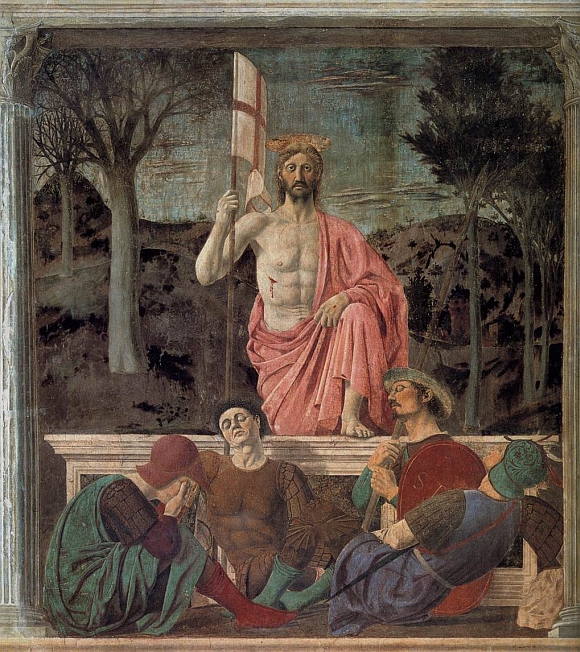
Idcirco iam rebus omnibus (ut Moses Timeusque testantur) absolutis, de producendo homine postremo cogitavit. Verum nec erat in archetipis unde novam sobolem effingeretn nec in thesauris quod novo filio hereditarium largiretur, o nec in subsellisp totius orbis, ubi universi contemplator iste sederet. Iam plena omnia; omnia summis, mediis infimisque ordinibus fuerant distributa…
Statuit tandem optimus artifex, ut cui dari nihil proprium poteratr commune esset quicquid privatum singulis fuerat. Igitur hominem accepit indiscretæ opus imaginis atque in mundi positum meditullio sic est alloquutus: «Nec certam sedem, nec propriam faciem, nec munus ullum peculiare tibi dedimus, o Adam, ut quam sedem, quam faciem, quæ munera tute optaveris, ea, pro voto, pro tua sententia, habeas et possideas. Definita cæteris natura intra præscriptas a nobis leges cohercetur. Tu, nullis angustiis cohercitus, pro tuo arbitrio, in cuius manu te posui, tibi illam prefinies. Medium tes mundi posui, ut circumspiceres inde commodius quidquid est in mundo. Nec te celestem neque terrenum, neque mortalem neque immortalem fecimus, ut tui ipsius quasi arbitrarius honorariusquet plastes in quam malueris tute formamu effingas. Poteris in inferiora quæ sunt brutav degenerare; poteris in superiora quæ sunt divina ex tui animi sententia regenerari»…
Nascenti homini omnifaria semina et omnigenæ vitæ germina indidit Pater. Quæ quisque excoluerit illa adolescent, et fructus suos ferent in illo. Si vegetalia planta fiet, si sensualia obrutescet, si rationalia cæleste evadet animalb, si intellectualia angelus erit et Dei filius.
Therefore, when everything was done (as Moses and Timaeus testify), He finally bethought himself of bringing forth humankind. But in the eternal archetype of things nothing was still to be found for the new offspring; nor did the Creator possess among His treasures a gift with which to endow his new son; nor was there a place left in the entirety of the world where the viewer of the Universe might seat himself. For the universe was filled; and to every circle, the highest as well as the lowest and the middle, beings of an appropriate order had already been assigned…
Then at last the Creator Artisan provided that the creature to whom He could give no special characteristic should, instead, possess the endowments of every other being of the common creation. He therefore shaped the human being accord to a general and indeterminate image, and placing him at the world’s center point said: “We have given you, Adam, no designated place nor features nor aspect proper to yourself alone, all so that whatever place, whatever features, whatever aspect you may responsibly wish for yourself, these things you may have and possess according to your desire and judgment. Once defined, the nature of all other beings, is constrained within the laws we have set for them. But you are not constrained by such limits, so you may determine these matters for yourself, according to your own free will, in whose hand we have placed you. I have placed you at the world’s center so that you may more easily take stock of what is in the world. We have made you neither of heaven nor of earth, neither mortal nor immortal, so that you may, as the free and extraordinary shaper of yourself, fashion yourself in the form you will prefer. It will be in your power to degenerate into the lower forms of life, which are brutish; equally you shall have the power, according to your soul’s judgment, to be reborn into the higher orders, which are divine…”
The Father hence instilled in humankind, at birth, every sort of seed and germs of every form of life. Those seeds which he cultivates shall grow and bear their fruit from within. If he cultivates the vegetable seeds, he will become a plant. If he cultivates the seeds of the senses, he will become brutish. If he cultivates the seeds of reason, he will become a celestial creature. If he follows the way of the intellect, he will be an angel and a son of God.
–Conte Giovanni Pico della Mirandola, Oratio de hominis dignitate, secs iii-iv(1486) in Opera pp. 314ff. (folio ed.)(S.H. transl.)(the creation myth)
Pico della Mirandola may have been the most wonderful and fleeting of the geniuses who crossed the stage of the Renaissance, and the Oratio may be the single work that best sums up the Renaissance ideal. Here is a dramatic reading of key passages from the Oratio with some commentary.



